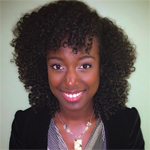“I was drawn to rheumatology as a medical student due to the intellectual challenge of ‘solving’ complex clinical cases, the opportunity to conduct research in a field with still many unknowns, and the ability to form long-lasting, meaningful relationships with patients,” she says.
Dr. Barbhaiya is focused on better understanding the epidemiology of incident systemic lupus erythematosus (SLE), outcomes related to SLE, including cardiovascular disease, mortality, and avascular necrosis of the bone, and classification of the antiphospholipid syndrome (APS).
“My goal is to help provide insight into the potential associations of environmental and behavioral risk factors for the development of SLE, and to better understand various outcomes related to cardiovascular diseases and survival in this population,” she says.
Her investigation of environmental risk factors for SLE using large prospective cohorts under the mentorship of Dr. Karen Costenbader earned her the 2015 Rheumatology Research Foundation Scientist Development Award. She is the ACR Classification Criteria Subcommittee fellow representative.
Q: What is it about rheumatology that keeps you so engaged?
A: In a field with still many unanswered questions and such complex diseases, there is much work yet to be done to better understand the etiology and outcomes related to these diseases. My motivation comes from hoping to contribute to answering these questions over the course of my career.
Q: What is the most fulfilling part of your job?
A: I am blessed to work with a phenomenal group of clinical and research colleagues and patients, and I truly enjoy going to work every day. It is particularly fulfilling to see the direct impact of research advances on patient care, and this is what motivates me to incorporate significant research into my career.
Q: What does this award mean to you?
A: While it feels incredible to be recognized for hard work, my father always taught me that awards should also serve to motivate one to work harder and better. That is what I intend to do.
Q: If you could change one thing about the field, what would it be?
A: That’s a no-brainer. Our diseases, which can be truly debilitating and often affect previously young, healthy individuals, need cures. Hopefully, research efforts over the next few decades (or sooner) will lead us to this ultimate goal.
 Ashira Blazer, MD, Instructor of Medicine in Rheumatology, New York University School of Medicine, New York
Ashira Blazer, MD, Instructor of Medicine in Rheumatology, New York University School of Medicine, New York
Background: Dr. Blazer was raised in a big family—her parents had 17 combined siblings. So the cousins grew up close as best friends. When several were diagnosed with lupus as young adults, she wanted to help.



